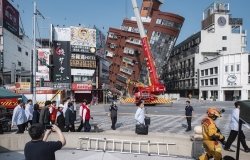How World Trade Institutions Stimulate Trade Reform in Closed Economies: The Case of India
Aseema Sinha, Woodrow Wilson Center Fellow, University of Wisconsin;Mac Desler, University of Maryland; Susan Sell, George Washington University. (This event is jointly sponsored by the Asia Program and the Program on Science, Technology, America, and the Global Economy.)
Overview
Aseema Sinha, Assistant Professor of Political Science, University of Wisconsin, Madison, and Fellow, Woodrow Wilson Center
I. M. Destler, Director, Program on International Security and Economic Policy, School of Public Policy, University of Maryland
Susan Sell, Associate Professor of Political Science and International Affairs, Elliott School of International Affairs, George Washington University
How and when do international trade institutions bring about change in closed economies? Using Indian involvement in the World Trade Organization (WTO) as a test case, Aseema Sinha explored these two questions in a May 11 seminar co-sponsored by the Asia Program and the Program on Science, Technology, America, and the Global Economy.
India has traditionally opposed trade liberalization and opening its economy to outsiders. The conventional wisdom, held by both globalists and anti-globalists, Sinha declared, maintains that the WTO overwhelms the nation-state and reduces state capacity. Yet, this is rather too simplistic an analysis in the case of India. A member of GATT (predecessor to the WTO) since 1947, India for better than four decades successfully resisted U.S. pressure and avoided its GATT commitments to open its economy. Domestic politics and the relationships among domestic actors were the driving forces behind Indian trade policy. When India finally made the decision in 1991 to open its economy, a balance of payments crisis rather than external pressure was the trigger for this turnaround.
Sinha examined the institutional changes within India since 1997/8-—such as the number of staff dealing with WTO-related issues, increased conflict across ministries, and the creation of new Indian institutions (a modernized patent administration, an anti-dumping department, an independent tariff commission)—-that simultaneously reflected and drove this new economic thinking. The institutional rules of the WTO have stimulated considerable change within India, she concluded. Yet India has not merely been a passive recipient of WTO demands. To the contrary, New Delhi has taken the lead in organizing developing countries to offer a coherent alternative to global reform.
The United States, I.M. Destler pointed out in a brief commentary, has followed a different route toward trade liberalization. Destler provided seminar participants with a brief history of U.S. trade policies since 1934, when an America mired in the Great Depression adopted the Reciprocal Trade Agreements Act and turned the county away from the protectionist policies that had prevailed since the mid-19th century. Destler noted that in adopting this legislation, the U.S. Congress ceded tariff setting authority to the executive branch, a delegation of powers that still characterizes U.S. tariff policy 70 plus years later. The WTO, Destler argued, operates only "at the margins" in the U.S. decision-making process that determines U.S. trade policy.
In her commentary, Susan Sell returned to a theme advanced by Sinha—-the manner in which developing countries are able to force the developed world to address their agenda. As an illustration of this phenomenon, Brazil has secured a favorable ruling after taking U.S. cotton subsidies to the WTO. During the ongoing Doha round of trade negotiations, India and Brazil led a bloc of poorer countries in wringing concessions from the developed world. These examples and others, Sell argued, demonstrate that membership in the WTO presents the developing world with opportunities to promote its own concerns even in the face of opposition by the world's rich countries.
Robert M. Hathaway, Director, Asia Program
Ph: (202) 691-4020
Hosted By

Indo-Pacific Program
The Indo-Pacific Program promotes policy debate and intellectual discussions on US interests in the Asia-Pacific as well as political, economic, security, and social issues relating to the world’s most populous and economically dynamic region. Read more
Thank you for your interest in this event. Please send any feedback or questions to our Events staff.










